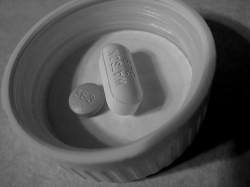Opiate Detox
Opiates are a class of drugs that are either derived from the opium poppy or they are synthesized in a laboratory setting to mimic the effects of drugs derived from the opium poppy. There are a number of different types of opiates including prescription painkillers such as Oxycontin and Morphine as well as dangerous street drugs such as heroin and opium. Opiates typically induce a sense of euphoria and relaxation that can aid in pain relief but, when taken successively or repeatedly, they have a high potential to cause physical dependence and subsequent addiction.
When a user becomes addicted to opiates and then decides that he or she wants to stop, quitting can be very difficult because the physical and psychological withdrawal symptoms of addiction take over. Opiate detox becomes a necessary starting point for a user to get the help that he or she needs to overcome opiate dependent and get back on track with a sober lifestyle.
Opiate Withdrawal

Opiate detox withdrawal symptoms can be very painful and uncomfortable.
Opiates, whether they are street drugs or prescription drugs, have the ability to cause powerful withdrawal symptoms when the user decides to quit taking the drug or to substantially lower the normal dose. While the symptoms of opiate withdrawal are rarely fatal, there are risks involved and medical treatment is often necessary to ensure the absolute safety of the user during treatment. Opiate withdrawal symptoms include:
- Nausea and vomiting
- Diarrhea and upset stomach or stomach cramps
- Insomnia and disturbances in sleep patterns
- Chills, sweats and fever
- Dehydration which could pose serious health risks
- Runny nose, flu-like symptoms or symptoms of the common cold
- Bone, joint or muscle pain
- Weakness or chronic fatigue
Opiates can cause withdrawal symptoms after just a few uses of the drug of choice and the symptoms can persist for many days in some cases. The severity of the addiction, the length of time the user abused an opiate, the method of opiate abuse and various other factors can make withdrawal more severe or may cause the symptoms to last longer in some cases.
Medications Used in Opiate Detox
Because the symptoms of opiate withdrawal have the potential to be so severe and difficult to cope with, a number of medications are commonly used in opiate detox to help the patient control his or her symptoms and remain sober. According to the National Institute on Drug Abuse, there are a few different medications that can be used to effectively control opiate withdrawal and keep symptoms at bay. These medications include:
- Buprenorphine
- Naltrexone
- Methadone
Many treatment professionals are hesitant to use methadone due to its strong potential for abuse and addiction. However, methadone maintenance has been proven effective for many users who suffer from opiate addiction and it can help to curb cravings and restore function into daily life allowing the user to receive further treatment and counseling which can aid in recovery.
Dangers of Rapid Detox
Some detox centers now tout the ability to rapidly detox an opiate user allowing him or her to experience minimal to no symptoms of withdrawal and effectively overcome physical dependence in a period of 2-3 days at most. While rapid detox may sound like a great idea, there are extreme dangers associated with this method of detox and the risks involved may not be worth the benefits as most users who detox this way opt out of further treatment and find themselves slipping back into addiction not long after the rapid detox takes place.
Rapid opiate detox involves placing the patient into a medical coma for a period of up to 72 hours during which time the user reaches the peak of withdrawal symptoms in a state of unconsciousness. Unfortunately, this method of detox is highly dangerous and could lead to fatal consequences. Rapid detox also costs substantially more than other methods of detox making it a less advisable choice overall.
Life After Opiate Detox
It’s important to consider the need for further treatment following opiate detox. Long after the patient is no longer physically dependent on drugs, there will still be underlying emotional, psychological and lifestyle related issues that must be accounted for and treated in order to guarantee an addict’s recovery from opiate addiction. Opiate detox serves as the first step of recovery but it is not the only step!
Effective opiate detox includes a referral to follow-up treatment and care in which the patient will receive individual and group counseling to help him or her build social skills, learn how to avoid relapse, develop a sense of self and heal psychologically from the pain caused by addiction. During treatment, counseling and therapy will help the user to learn new behaviors and a new way of life that will aid in their long-term recovery from opiate addiction.
Detox is a vital first step of recovery, but many months of treatment may be necessary to fully ensure the sobriety and continued abstinence for the user. Opiate addiction isn’t a death sentence, but if it is left untreated, the resulting consequences of using these dangerous drugs could be.

